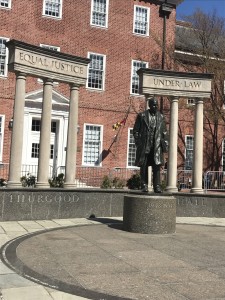By: Brandon Green
A fter a swift deliberation Wednesday, the House Judiciary Committee ruled in favor of a marijuana expungement bill.
fter a swift deliberation Wednesday, the House Judiciary Committee ruled in favor of a marijuana expungement bill.
The bill will allow people convicted for possession, of less than 10 grams of marijuana, the ability to expunge it from their record.
If signed by Gov. Larry Hogan, the bill will take effect Oct. 1, 2017, and would be added to other expungable violations such as acquittals, dismissal of charges, and entry of probation before judgment.
According to Democratic Sen. William Smith of Maryland, under current law, in order for a convicted marijuana violator to be eligible for expungement, they cannot commit a violent crime for 10 years.
Smith said this bill was made to speed up the process, which is why individuals will be eligible for expungement five years after conviction.
According to the Department of Legislative Services’ fiscal and policy note, prior to Oct. 1, 2014, a person in possession of less than 10 grams of marijuana was subjected to a penalty of imprisonment for up to 90 days or a maximum fine of $500.
“These convictions have a disproportionate impact on communities of color, especially African Americans, this [bill] is particularly important for communities of color to get back on mainstream,” Smith said.
This bill is a continuation of the Justice Reinvestment Act, which was created to get nonviolent drug offenders out the criminal system, and to put the money spent on them back into the education system.
According to Smith, this expungement bill can also help people get government jobs, because a marijuana criminal violation can be expunged from their record.
“[For those] who this is their first problem with the law, [this bill] allows them to clear their record so they can get back to school, get student housing, and get back on track with life,” Smith said.
According to Frederick City Police Chief Edward Hargis, the bill can help those who were convicted for marijuana violations pursue law enforcement careers.
“[For] those who have been arrested for marijuana prior to this, there could be multiple arrests that prevent them from being police officers,” Hargis said. “Through the expungement process, those individuals may be available to come and apply for a law enforcement position.”
Hargis said he also believes that this bill can create a more diverse work environment for law enforcement, and help in the long run because having less than 10 grams of marijuana is now a civil violation.
According to the Department of Legislative Services’ fiscal and policy note, the number of violations and convictions for possession of marijuana in 2016 has gone down about 39 percent since 2007.
The Frederick City Police go through a strict process of handling expungement, according to Hargis.
First, their recorder of records gets notified by the court to go delete the crime file of the individual, then delete all the identifiers, and lastly take out any fingerprint cards.
Hargis said he does not anticipate this bill will change that process; he feels everything will stay the same.
The extent of the bill’s impact will depend on the number of individuals who are eligible for expungement of their convictions for possession of marijuana, according to the Department of Legislative Services’ fiscal and policy note.
The economic impact of this bill will not be significant; however, it will affect the court system.
According to the Department of Legislative Services’ fiscal and policy note, the general revenues might increase significantly from filing fees for expungement petitions in the district court or appellate courts.
The district court collected about $740,000 in filing fees for petitions for expungement between Sept. 1, 2015, and Sept. 1, 2016.
According to the Maryland Judiciary, that number is expected to rise if this bill is signed by the governor.